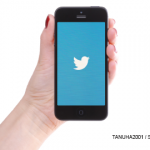
PiXXart/shutterstock.com
Social media has revolutionized my practice. I stay current with Twitter content from other rheumatologists, patient organizations and medical journals. I am also an active member of the international Twitter-based rheumatology journal club, #RheumJC. Still, I was recently surprised when my patient’s name appeared in a friend request.
This same patient was following me on Twitter, where I had no say in the matter, but this did not affect me. (There is an option to restrict your followers, but those sorts of restrictions would defeat the purpose of my account, because I was [and still am] trying to share my knowledge and findings on Twitter rather than restrict them.) I was pleased that my patient wanted to become more involved with his care and that following me on Twitter meant that he was following a reputable source of information. However, when the friend request popped up on Facebook, I felt uneasy and uncertain about what to do next. I also wondered if there were any accepted standards for interacting with patients using social media.
Discussion
The practice of consulting the Internet on health matters is ubiquitous. Eighty percent of those on the Web are seeking healthcare information, and more than one-third of U.S. caregivers participate in online social activities.1,2 Social media has become an efficient tool to disseminate medical information, to promote patient safety and health literacy, and to engage patients and providers in health advocacy. Younger trainees are now learning with the power of one thumb, and patient outcome research is now using social media with increasingly positive results. Medicine is changing, and social media is reshaping the patient–physician relationship as we know it.3
There is no clear, accepted standard on how to use social media in a patient–physician relationship. The Sixth Edition of the American College of Physicians Ethics Manual warns physicians who use online media about the potential to blur social and professional boundaries and recommends that physicians record any patient–physician interactions.4 Additionally, the mere existence of an online patient–physician relationship could, in some cases, represent a violation of the Health Insurance Portability and Accountability Act of 1996.
How can we ensure the security and privacy of messages sent to and from patients? How can physicians ensure that patients are conscientious about the issue of privacy? Although patients’ information belongs to them, physicians who engage in social media may have a role in educating patients to ensure they know that a message they think is personal may be seen by the whole network of the person to whom it was directed, depending on the privacy settings and policies of the social media platform.
The absence of a face-to-face relationship may also create a false sense of anonymity, and this misapprehension has led to many abuses and misuses of social media by healthcare professionals and medical students.5 Patients may feel they can obtain medical advice from their physicians through social media, when in fact, their physicians may not be legally able, or willing, to give advice online without seeing them in person. On the other hand, if a physician sees a patient abusing alcohol on social media, how much of this information should be used to make management decisions, such as starting methotrexate?
Physicians are discouraged from providing care to their own family members and friends.6 The American College of Physicians Ethics Manual states: “Physicians should usually not enter into the dual relationship of physician–family member or physician–friend for a variety of reasons. The patient may be at risk of receiving inferior care from the physician. Problems may include effects on clinical objectivity, inadequate history-taking or physical examination, over-testing, inappropriate prescribing, incomplete counseling on sensitive issues, or failure to keep appropriate medical records.”4
Becoming friends with a patient on social media may lead to a deeper interpersonal relationship, one that may blur the boundaries of the patient–physician relationship.
Professional organizations have developed a few guidelines for interacting with patients on social media. The American Medical Association’s policy, for example, advises physicians to establish “appropriate boundaries” in their relationships with their patients.7 It further advises against publishing any confidential health information online and making sure that professional content is kept separate from personal content on social media platforms.
The Journal of Medical Ethics goes even further: It advises against accepting any friend requests from patients and against sending friend requests to patients.8 Physicians who are worried that they may damage the patient–physician relationship by rejecting a patient’s friend request should have a face-to-face conversation with the patient, explaining the ethical problems of an online social relationship.
Preserving the Relationship
At the next follow-up appointment, I explained to my patient that I had not yet created a professional Facebook account, and that I would notify him once I established that account. I also discussed other online patient resources on social media networks, such as #RheumChat, #Creakyjoints, #PatientsLikeMe and my own professional Twitter account. He gratefully accepted the information, and we continued our scheduled office visit.
Isabelle Amigues, MD, is a clinical fellow in the Division of Rheumatology at Columbia University College of Physicians and Surgeons, and New York Presbyterian Hospital, New York. Follow her on Twitter: @isa75012.
Paul Sufka, MD, is a staff rheumatologist with Health Partners & Regions Hospital, St. Paul, Minn. Follow him on Twitter: @psufka.
Acknowledgment
The authors thank Dr. Jane S. Kang, MD, for her critical review of the manuscript.
References
- Weaver J. More people search for health online. NBCNews.com. 2013 Jul 16.
- Fox S, Brenner J. Main report. Caregivers in the U.S. Pew Research Center. 2012 Jul 12.
- Berenbaum F. The social (media) side to rheumatology. Nature Rev Rheumatol. 2014 May;10(5):314–318.
- Snyder L. American College of Physicians Ethics Manual: sixth edition. Ann Intern Med. 2012 Jan 3;156(1 Pt 2):73–104.
- Greysen SR, Chretien KC, Kind T, et al. Physician violations of online professionalism and disciplinary actions: A national survey of state medical boards. JAMA. 2012 Mar 21;307(11):1141–1142.
- La Puma J, et al. When physicians treat members of their own families. Practices in a community hospital. N Engl J Med. 1991 Oct 31;325(18):1290–1294.
- American Medical Association. Opinion 9.124—Professionalism in the use of social media. AMA Code of Medical Ethics.
- Moubarak G, Guiot A, Benhamou Y, et al. Facebook activity of residents and fellows and its impact on the doctor–patient relationship. J Med Ethics. 2011 Feb;37(2):101–104.
Editor’s note: If you have comments or questions about this case, or if you have a case that you’d like to see in Ethics Forum, email us at [email protected].


